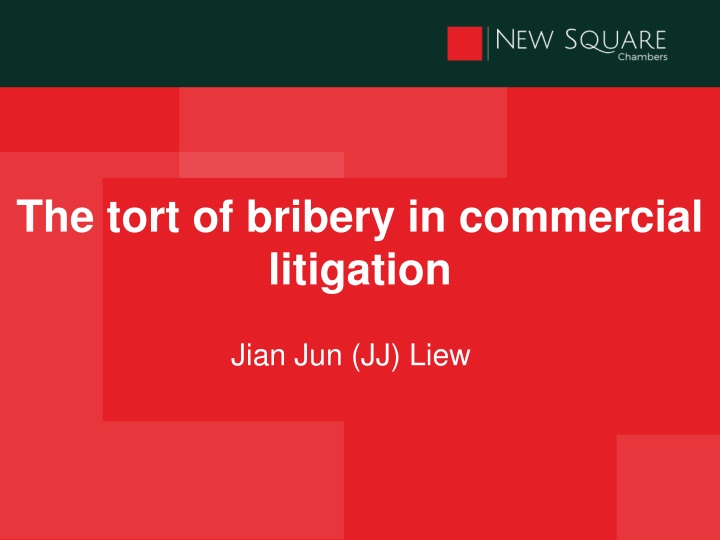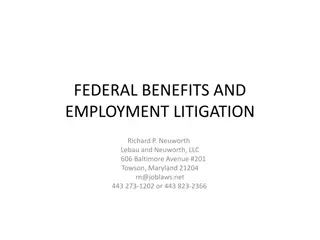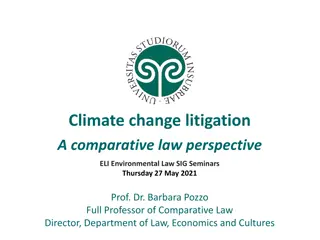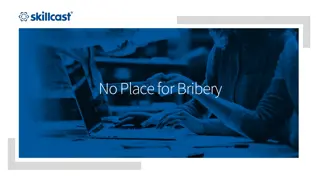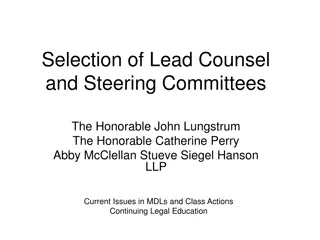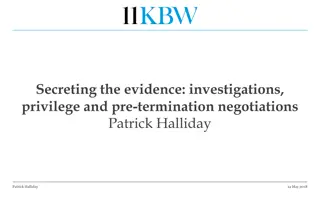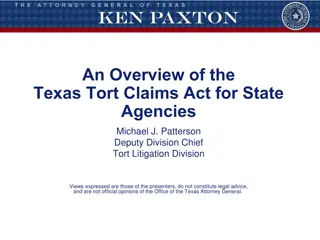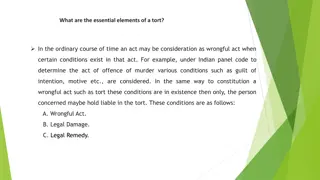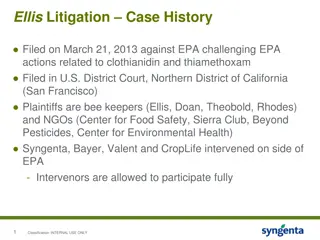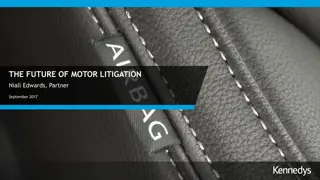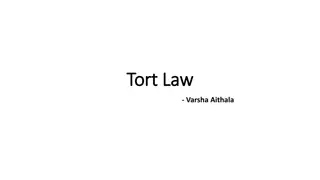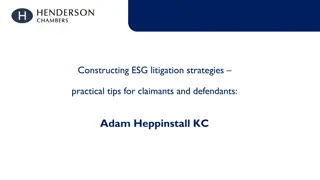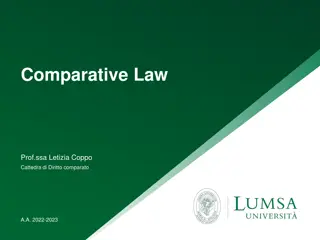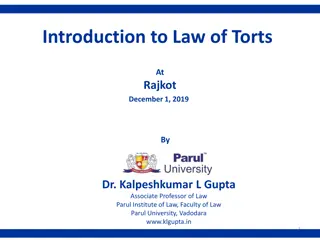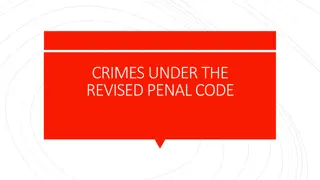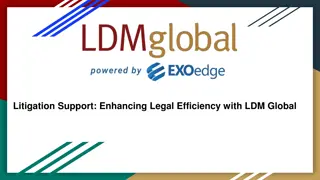The Tort of Bribery in Commercial Litigation
The tort of bribery in commercial litigation involves a briber giving a bribee a secret inducement, leading to influence over the principal's decisions resulting in losses. Policy background emphasizes the threat of bribery to society. The tort involves three parties - the briber, bribee, and claimant/principal. Key elements include presumptions about corrupt motives and loss, with duties breached causing harm.
Download Presentation

Please find below an Image/Link to download the presentation.
The content on the website is provided AS IS for your information and personal use only. It may not be sold, licensed, or shared on other websites without obtaining consent from the author.If you encounter any issues during the download, it is possible that the publisher has removed the file from their server.
You are allowed to download the files provided on this website for personal or commercial use, subject to the condition that they are used lawfully. All files are the property of their respective owners.
The content on the website is provided AS IS for your information and personal use only. It may not be sold, licensed, or shared on other websites without obtaining consent from the author.
E N D
Presentation Transcript
The tort of bribery in commercial litigation Jian Jun (JJ) Liew
Type of cause of action A wrong which is sui generis and defies classification. These claims have all been held to be claims in tort, even though some of them can also be categorised as contractual (if against the employee or agent) or restitutionary or perhaps an equitable claim for breach or dishonest assistance in breach of fiduciary duty.
Policy backdrop of the tort Bribery is an evil practice which threatens the foundations of any civilised society. Lord Templeman AG for Hong Kong v Reid [1994] 1 AC 324
Parties involved in the tort Three parties: Briber Bribee Claimant/Principal
What is a bribe? Anangel Atlas Compania Naviera SA v Ishikawajima-Harima Heavy Industries [1990] 1 Lloyd s Rep 167 at 171. A commission or other inducement which is given by a third party to an agent as such, and which is secret from his principal.
What is the tort of bribery? Briber gives bribee a bribe. Bribee owes some form of duty to the principal. The principal of the bribee does not have knowledge of the bribe. As a result of the bribe, the bribee exercises some form of influence over the decision-making of the principal. As a result of that influence, the principal enters into a contract or some other arrangement with the briber (or some other party). This contract or arrangement causes loss to the principal.
The 4 presumptions + 1 Daraydan Holdings Ltd v Solland International Ltd [2005] Ch 119 at [53]. Presumed that the briber acted with a corrupt motive. Presumed that the bribee s mind was affected by the bribe. Presumed that the briber knew or suspected that the bribee would conceal the bribe from the principal. Presumed that the principal had suffered loss as a result of the bribery by at least the value of the bribe. Not necessary for principal to show that the bribe was given in connection with a particular contract.
Elements of the tort Airbus Operations Ltd v Paul Withey [2014] EWHC 1126 (QB) at [88]. 1. Receipt of money or a valuable benefit. 2. By a person who is under a duty to provide information, advice or recommendation on an impartial or disinterested basis or otherwise capable of influencing the principal. 3. Which is kept secret from the principal. 4. Which places the bribee in a position of potential conflict with their principal.
Benefit Gift must not be too small, must be sufficient to give rise to possibility of conflict Fiona Trust v Privalov [2010] EWHC 3199 (Comm) at [73](ii). Benefit need not be actual, can be the promise of a benefit held out by the briber or an expectation of one Novoship (UK) Ltd v Mikhaylyuk [2012] EWHC 3586 (Comm) at [106]. Benefit does not need to be made directly to bribee, e.g. payments to family members, discretionary trusts, or anyone who bribee wants to benefit Novoship v Mikhaylyuk at [107].
Benefit Assumption of material risk in a profit share a sufficient benefit Kings v King [2021] EWHC 325 (Ch) at [152]-[153]. Immaterial that there is no causal connection between benefit and breach of duty United PAN-Europe Communications NV v Deutsche Bank AG [2000] 2 BCLC 461 at [47].
Duty Wood v Commercial First Business Ltd [2021] EWCA Civ 471 at [48], [92]. The question, I consider, is the altogether simpler one of whether the payee was under a duty to provide information, advice or recommendation on an impartial or disinterested basis. it is the duty to be honest and impartial that matters.
Duty Wood v Commercial First at [51], citing Novoship v Mikhaylyuk at [108]. It is enough, in my view, that the person who is offered or paid a secret commission is, as Christopher Clarke J put it , someone with a role in the decision-making process in relation to the transaction in question e.g. an agent, or otherwise someone who is in a position to influence or affect the decision taken by the principal .
Secrecy Half-secret commissions not covered, dealt with by breach of fiduciary duty instead: Hurstanger Ltd v Wilson [2007] EWCA Civ 299, Medsted Associates v Canaccord Genuity Wealth (International) Ltd [2019] EWCA Civ 83, Wood v Commercial First. Not a defence for the briber to say that they thought the bribee would disclose (or had disclosed) the benefit to the principal.
Potential conflict No need to show actual conflict Airbus v Paul Withey at [424]. Not a defence to show that there was no actual conflict Airbus v Paul Withey at [425].
Remedies - compensatory Compensation for loss suffered by the principal. Joint and several liability between briber and bribee. Presumed that loss suffered was at least the value of the bribe, but it is open to the principal to prove that a greater loss was suffered.
Remedies - restitutionary Money had and received in the value of the bribe joint and several liability. Restitution for wrongs and a right to account as against the bribee FM Capital Partners Ltd v Marino [2020] EWCA Civ 245. Defence of change of position not available to bribee FM Capital v Marino. Query whether this also extends to briber.
Remedies - proprietary? Formerly the position that a proprietary claim would be allowed due to the constructive trust imposed from European Ventures LLP v Cedar Capital Partners LLC [2014] UKSC 45. See e.g. FM Capital Partners v Marino [2018] EWHC 1768 (Comm). Query whether this would still be the case after Wood v Commercial First as the constructive trust was expressly argued on a fiduciary duty basis.
Remedies - rescission Common law rescission as of right for the contract entered into with the briber, subject to counter-restitution Wood v Commercial First, Conway v Prince Arthur Ikpechukwu Eze [2018] EWHC 29 (Ch)at [156]. Equitable rescission potentially no longer an option given the removal of fiduciary requirement in Wood v Commercial First.
Power to elect remedies Need to elect between compensatory and restitutionary remedies before judgment Mahesan v Malaysia Government Officers Co- operative Housing Society Ltd [1979] AC 374 at 383; Novoship v Mikhaylyuk at [111]. Right to rescind as against the briber can be elected in addition. In relation to complex bribery cases with multiple bribees, election can be different as between each bribee FM Capital Partners v Marino. This can be used to a principal s advantage where some claims are settled.
Power to elect remedies Query whether it is open to a principal to attempt and fail to prove compensatory loss greater than the presumption, and then fall back onto the restitutionary remedy. For: Airbus v Paul Withey at [528] election not irrevocable until judgment is entered. Against: Chancery Client Partners Limited v MRC 957 Limited [2016] EWHC 2142 (Ch) and Motortrak Ltd v FCA Australia Pty Ltd [2018] EWHC 990 (Comm) court did not give principal the chance to run both.
Bribery or fiduciary duty? Advantages Bribery claim catches both briber and bribee with one cause of action without needing to plead accessory liability. No need to prove fiduciary duty. Compensatory remedy may potentially lead to greater quantum than the account remedy in breach of fiduciary duty when there are consequential losses. Bribery claim potentially easier to prove if a restitutionary remedy or rescission is sought due to its presumptions, minimal causation requirements, and the bribee being unable to rely on a change of position defence. As a tort, remedies are available as of right with a further power to elect for the most optimal remedies.
Bribery or fiduciary duty? Disadvantages Bribery claims can sometimes be more complicated to prove. Breach of fiduciary duty viable for half-secret commission cases, but a bribery claim would fail due to the secrecy element Hurstanger at [39]. Bribery claim potentially no longer has a proprietary remedy after Wood v Commercial First. Right to rescind in equity (i.e. at the court s discretion potentially without restitutio in integrum) potentially no longer available for a bribery claim after Wood v Commercial First. Law of bribery is less developed, with High Court decisions which are sometimes inconsistent on some principles.
Relevant situations Agreements or arrangements involving third-party introducers. Company employees and/or directors receiving kickbacks or other benefits. Multi-party agreements or arrangements. Tenders or other competitive selection processes.
Q&A and thanks Jian Jun (JJ) Liew jj.liew@newsquarechambers.co.uk
